Vegan Diet
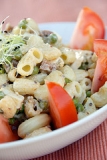
A vegan diet is one that includes only a vegetarian diet, which means the exclusion of meat non veg food items, and other animal products and the by products such as eggs , dairy products and honey. Therefore anything of animal origin is completely avoided by vegans. People choose a vegan diet for several reasons, some do it on humanitarian grounds , while some choose to follow it on the basis of religion etc. Therefore a vegan diet strictly includes plenty of fruits and vegetables, Legumes and seeds, whole grains and nuts.
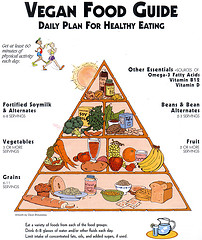
The difference between Vegenism and Vegetarianism:
A vegan as mentioned before completely avoids any food product of animal origin, even a product like honey, however a vegetarian may be a lacto-vegetarian (a vegetarian who consumes dairy products as well) or an ovo-vegetarian (a vegetarian who consumes eggs ). When Veganism is adopted, it is a gradual process, some people adopt the diet however they try to include certain vegetarian items that look like meat products, for example soya nuggets , while other change to veganism directly.
Protein sources in a Vegan Diet:
Whole grains (eg. whole wheat flour, bread and pasta, brown rice, oats, rye), nuts (eg. hazels, cashews, brazils, almonds), seeds (sunflower, sesame, pumpkin), legumes/pulses (peas, beans, lentils), soy products (flour, soy milk, tofu, tempeh).
Carbohydrate sources in a Vegan Diet:
Whole grains (e.g. wheat, oats, barley, rice), wholewheat bread, pasta and other flour products, lentils, beans, potatoes, dried and fresh fruit.
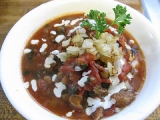
Fat Sources in a Vegan Diet:
Nuts and seeds, nut and seed oils, vegan margarine, avocados.
Sources of Essential Fatty Acids in a Vegan Diet: Two polyunsaturated fatty acids not made by the body are linoleic acid (omega 6 group) and alpha-linolenic acid (omega 3 group).
(omega 6) Linoleic Acid: Safflower, sunflower, corn, evening primrose & soy oils.
(omega 3)Alpha-linolenic Acid: Flaxseed, pumpkin seed, walnut, soy & rapeseed (canola) oils.
Alpha-linolenic Acid (omega 3): Flaxseed, pumpkin seed, walnut, soy & rapeseed (canola) oils.in Vegan Diet Wheatgerm, whole grains nuts, pulses, tofu, soy protein, miso, peas, parsley, bean sprouts (alfalfa)(whole wheat bread, rice, oats).
Note: The correct balance for omega-6:omega-3 intake is roughly 3:1.
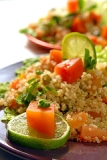
Vitamin sources in a Vegan Diet:
Vitamin A: Carrots, spinach, pumpkins, tomatoes, dark greens, vegan margarines.
Vitamin B: Nuts, whole grains, oats, muesli, pulses (peas, beans, lentils), yeast extracts, green leafy vegetables, potatoes, mushrooms and dried fruit. B12 supplements, fortified yeast extracts, soy milks (eg Plamil), TVP products, some breakfast cereals (eg. Nutri-Grain) – check labels. Seaweed and fermented products (eg. tamari, miso and tempeh) may contain some B12 but they are not reliable sources.
Vitamin C: Red and blackcurrants, berries, citrus fruits (e.g. oranges, lemons, grapefruit), green vegetables, potatoes.
Vitamin D: Action of sunlight on the skin, vitamin D-fortified foods like vegan margarines, some soy milks (eg. Plamil) and supplements.
Vitamin E: Nuts, seeds, whole grains and flours, vegetable oils.
Sources of Folate: Wheatgerm, raw/lightly-cooked green leafy vegetables (eg. broccoli, spinach), yeast, yeast extracts, nuts, peas, green ‘runner beans’, oranges, dates, avocados, whole grains.
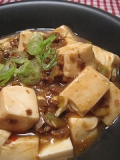
Mineral sources in a Vegan Diet:
Calcium for Vegans: Nuts, seeds, pulses (eg. soy beans, tofu, miso-fermented soybean curd, haricot beans), molasses, carob, parsley, figs (dried), sea vegetables, grains (eg. oatmeal), fortified soy milks.
Sources Iron in Vegan Diet: Nuts, seeds, pulses, grains, dried fruit, sea vegetables, parsley, green leafy vegetables, molasses, miso.